In today’s world, accessibility is more important than ever. As awareness and understanding of the needs of individuals with disabilities grow, the hospitality industry is taking significant steps to ensure their facilities are inclusive and welcoming. This blog explores the various ways hotels are improving accessibility, making travel easier and more enjoyable for everyone through accessible accommodations.
Wheelchair-Friendly Rooms For Accessible Accommodations
One of the most noticeable changes in accessible accommodations is the availability of wheelchair-friendly rooms. These rooms are designed to provide ample space for maneuvering, with wider doorways, lowered beds, and accessible bathrooms equipped with roll-in showers and grab bars. These thoughtful modifications ensure that guests using wheelchairs can navigate their rooms with ease and comfort.
Braille Signage For Accessible Accommodations
For guests with visual impairments, braille signage is a crucial feature. Many hotels now include braille on room numbers, elevator buttons, and directional signs throughout the property. This simple yet effective measure allows visually impaired guests to move around the hotel independently and confidently.
Sensory-Friendly Amenities
Hotels are also becoming more attuned to the needs of guests with sensory sensitivities. Sensory-friendly rooms may feature soundproofing, blackout curtains, and calming color schemes to create a peaceful environment. Additionally, some hotels offer sensory kits with items like weighted blankets and noise-canceling headphones to help guests feel more at ease during their stay.
Training and Awareness
Beyond physical modifications, hotels are investing in training programs for their staff to ensure they understand and can assist guests with various disabilities. This includes training in how to communicate effectively with guests who have hearing or speech impairments, as well as how to provide appropriate support to those with mobility challenges.
Technology and Accessibility
Advancements in technology have also played a significant role in improving accessible accommodations. Voice-activated room controls, accessible mobile apps for booking and check-in, and in-room tablets with accessibility features are becoming more common. These innovations make it easier for guests with disabilities to manage their hotel experience independently.
Community and Advocacy
Hotels are increasingly working with disability advocacy groups to better understand the needs of their guests and to ensure their facilities meet or exceed accessibility standards. By collaborating with these organizations, hotels can continually improve their services and offer a more inclusive environment.
Conclusion
The hospitality industry is making great strides in improving accessibility for guests with disabilities. From wheelchair-friendly rooms to braille signage and sensory-friendly amenities, these efforts ensure that all guests can enjoy a comfortable and welcoming stay. As hotels continue to innovate and prioritize accessibility, the travel experience for individuals with disabilities will only get better.
By implementing these features and fostering an inclusive environment, hotels not only comply with legal requirements but also demonstrate their commitment to offering exceptional service to all their guests. Accessible accommodations are not just a trend; it is a necessary and ongoing effort to create a world where everyone can explore and enjoy new experiences without barriers.
https://www.pexels.com/photo/bathroom-interior-1457847
4o



